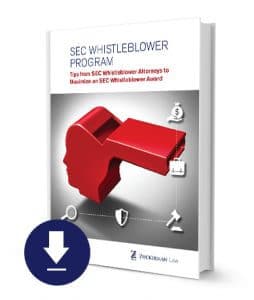The Dodd-Frank Act, which created the SEC Whistleblower Program, prohibits retaliation against whistleblowers for raising concerns about potential securities law violations. Remedies for a prevailing whistleblower include reinstatement, double back pay, litigation costs, expert witness fees, and attorneys’ fees.
Retaliation for whistleblowing to the SEC is also proscribed by the whistleblower protection provision of the Sarbanes-Oxley Act (“SOX”). The remedies are similar to those under Dodd-Frank, but SOX also includes special damages, such as emotional distress, impairment of reputation, and other non-economic harm resulting from retaliation. Click here for information about additional options to combat retaliation against SEC whistleblowers.
The attorneys at Zuckerman Law have extensive experience litigating retaliation cases. For more information about whistleblower rewards and bounties, contact the SEC whistleblower lawyers at Zuckerman Law at 202-262-8959.






See our tips to maximize your recovery in a whistleblower retaliation case.
Click below to hear SEC whistleblower lawyer Matt Stock’s tips for SEC whistleblowers:
Prohibited Retaliation Against Dodd-Frank SEC Whistleblowers
Dodd-Frank Act Whistleblower Protection
Protections for SEC Whistleblowers Post-Digital Realty (11-6-2020)Whistleblower Retaliation Damages
Tips for SEC Whistleblowers
To learn more about the SEC Whistleblower Program, download Zuckerman Law’s eBook: SEC Whistleblower Program: Tips from SEC Whistleblower Attorneys to Maximize an SEC Whistleblower Award:
How to Qualify for an SEC Whistleblower Award
SEC Whistleblower Awards
SOX Whistleblower Protection for SEC Whistleblowers
Frequently Asked Questions About the Sarbanes-Oxley Corporate Whistleblower Protection Law from Experienced SOX Whistleblower Lawyers
Protected Whistleblowing Under the Sarbanes-Oxley Act
- Who is protected under the whistleblower protection provision of the Sarbanes-Oxley Act?
- What whistleblowing disclosures are protected under the Sarbanes-Oxley Act?
- What are examples of SOX-protected activity (protected whistleblowing)?
- Does the Sarbanes-Oxley Act protect whistleblowing about potential violations of federal securities laws?
- Are SOX whistleblowers required to show that their disclosures relate “definitively and specifically” to a federal securities law?
- Is an employee’s participation in an investigation of corporate fraud protected under the Sarbanes-Oxley Act?
- What are some types of proof to show that a disclosure is objectively reasonable?
- Is a whistleblower’s motive for engaging in protected activity relevant in a whistleblower protection case?
- Does Sarbanes-Oxley protected conduct require a showing of materiality?
- Is a Sarbanes-Oxley whistleblower required to prove fraud?
- Are disclosures made in the course of performing one’s job duties protected?
- Must a SOX whistleblower prove that the individual who made the final decision to take the adverse action has personal knowledge of the whistleblower’s protected activity?
- Does the Sarbanes-Oxley whistleblower law protect employees working outside the United States?
Prohibited Whistleblower Retaliation Under Sarbanes-Oxley
- What acts of retaliation are prohibited by the Sarbanes-Oxley whistleblower protection law?
- Is constructive discharge a prohibited act of retaliation under SOX?
- Does SOX prohibit employers from “outing” confidential whistleblowers?
- Is retaliation that occurred outside of the statute of limitations period relevant evidence of retaliation?
- Does subjecting an employee to heightened scrutiny evidence retaliation?
- Does SOX prohibit post-termination retaliation?
- What is preemptive retaliation?
Proving Sarbanes-Oxley Whistleblower Retaliation
- What is a whistleblower’s burden to prove retaliation under the Sarbanes-Oxley Act?
- How can a whistleblower prove retaliation?
- Must a whistleblower prove retaliatory motive in a DOL whistleblower retaliation case?
- Why should courts be skeptical of an adverse employment action taken based on subjective criteria?
- What are some methods to prove pretext in retaliation and discrimination cases?
- Does a SOX whistleblower need to prove that the employer’s reason for the adverse action is untrue?
- What is the employer’s burden in a Sarbanes-Oxley whistleblower retaliation case?
- Does subjecting an employee to heightened scrutiny evidence retaliation?
Relief or Damages for SOX Whistleblowers
- What damages can a whistleblower recover under SOX?
- Does the Sarbanes-Oxley whistleblower protection law authorize emotional distress damages?
- What is front pay?
- Can OSHA order the reinstatement of a Sarbanes-Oxley whistleblower?
- If reinstatement is not feasible, can a judge award front pay in lieu of reinstatement?
- Does SOX authorize an award of punitive damages?
Litigating Sarbanes-Oxley Whistleblower Retaliation Cases
- Can I sue an individual under the Sarbanes-Oxley Act?
- What is the statute of limitations for a SOX whistleblower retaliation case?
- Who administers the whistleblower-protection provision of SOX?
- What level of detail is required in a Sarbanes-Oxley complaint?
- Can a Sarbanes-Oxley whistleblower bring a retaliation case in federal court?
- Does the Sarbanes-Oxley Act authorize jury trials?
- Where are SOX whistleblower cases litigated?
- Do formal rules of evidence apply in Sarbanes-Oxley whistleblower trials at the Department of Labor?
- What is the scope of discovery in a Sarbanes-Oxley whistleblower case?
- What is the “reasonable cause” standard in an OSHA whistleblower investigation?
- Can a Sarbanes-Oxley whistleblower appeal an Administrative Law Judge’s decision?
- Where can a Sarbanes-Oxley whistleblower appeal a decision of the Administrative Review Board?
- Do mandatory arbitration agreements encompass SOX whistleblower claims?
- Does OSHA prohibit gag clauses in settlement agreements?
- Does Section 806 of SOX preempt other claims or remedies?
Additional FAQs About the Sarbanes-Oxley Whistleblower Protection Law
- Why did Congress enact the whistleblower protection provision of the Sarbanes-Oxley Act?
- Can whistleblowers obtain rewards or bounties for reporting fraud to the SEC?
- Does the breach of an anti-retaliation policy in a Code of Ethics give rise to a retaliation claim?
- Does concealment of potential liability violate federal securities laws?
- Can corporate whistleblowers use company documents to expose fraud?
- Does the SEC protect whistleblowers?
- What is the half-truth doctrine in federal securities law?
whistleblower_lawyers_012017_infographic




